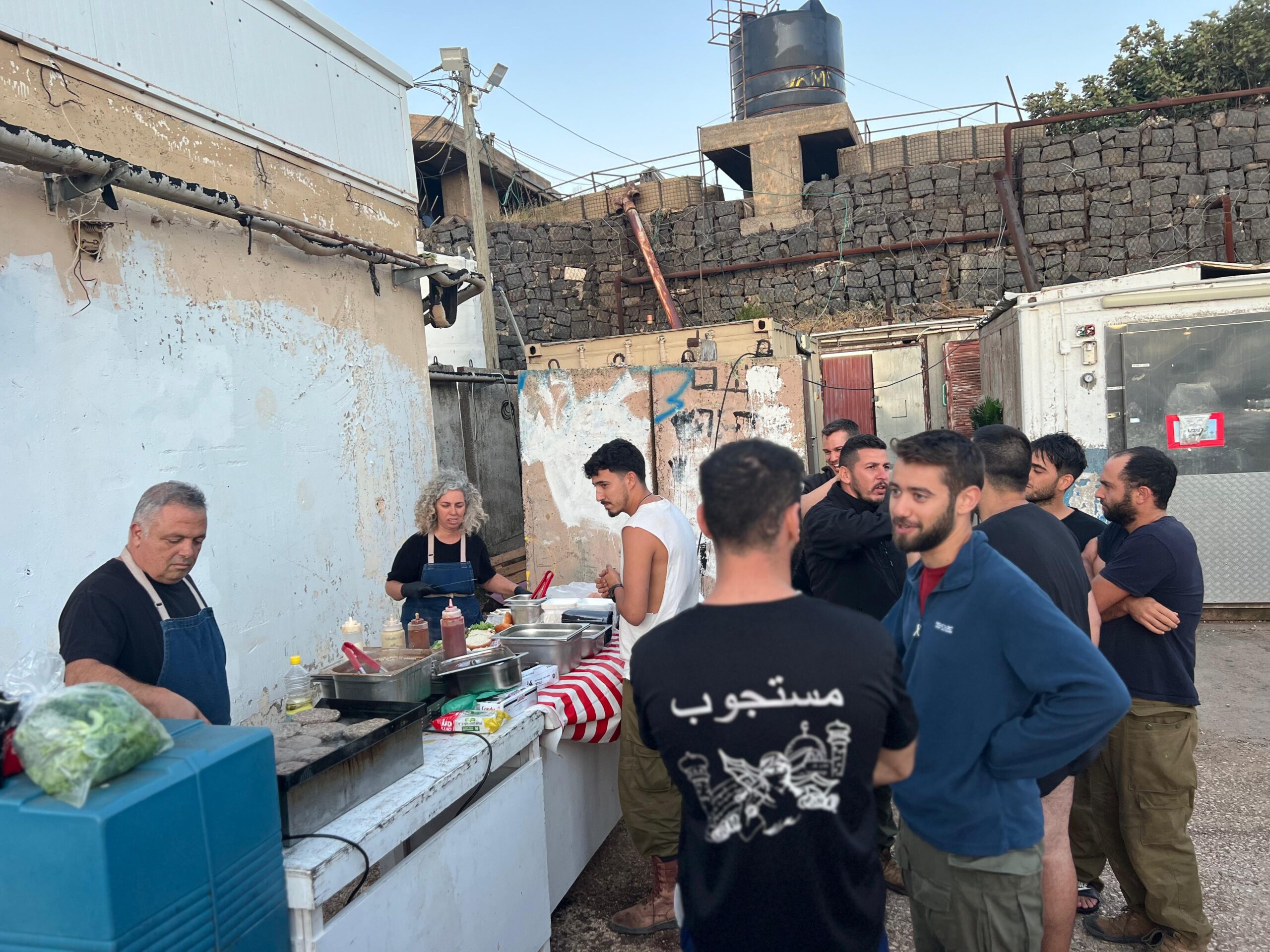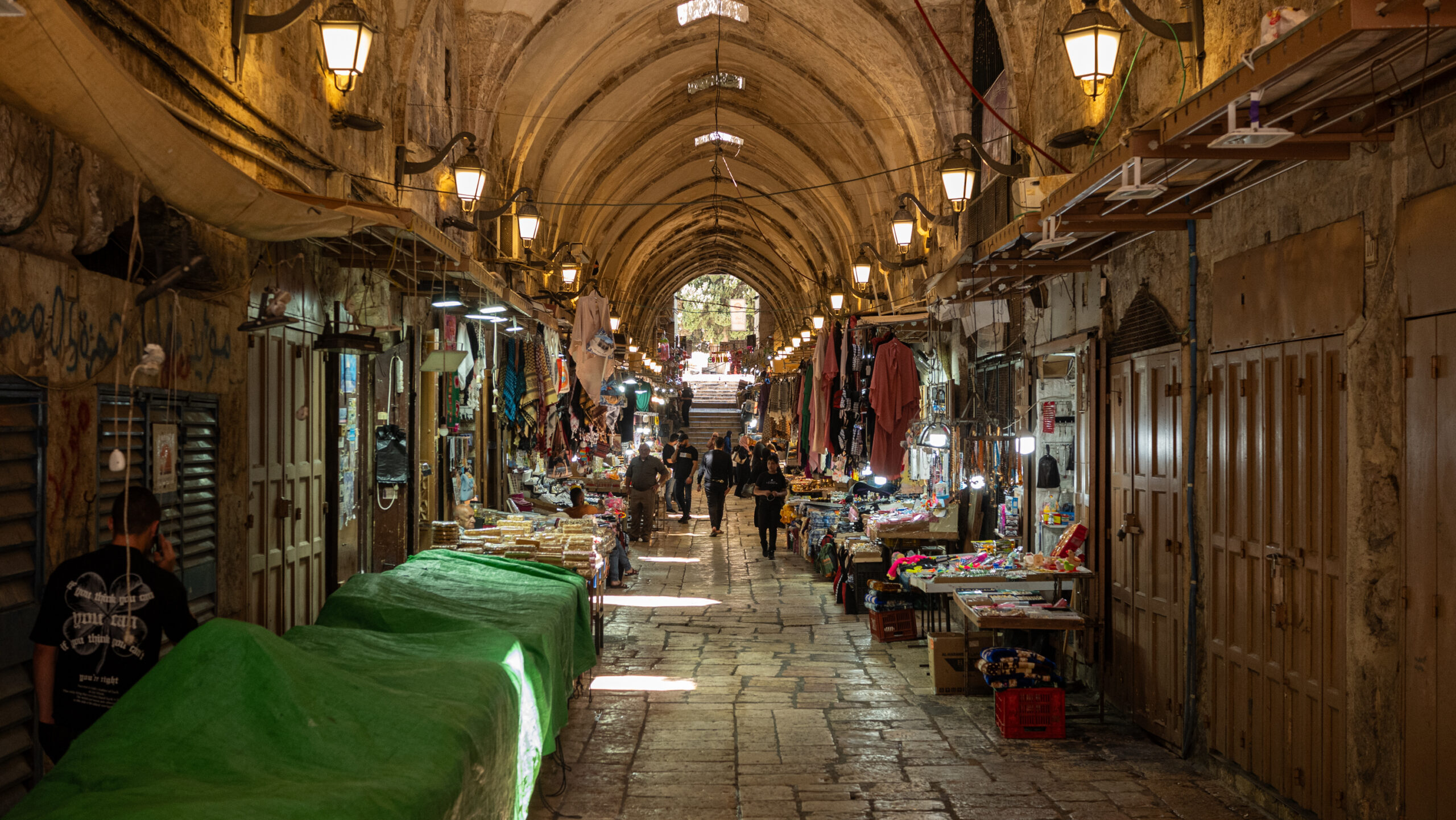Israel’s Tourism Sector Struggles Under Strain of Lengthy War
While the military operation in the Gaza Strip has scaled down significantly, there is growing concern a war will soon erupt on Israel’s northern border—which won’t help the tourism sector recover
It is the height of cherry season in northern Israel. Usually, this is peak tourism season as the summer begins, and the area is full of greenery after a rainy winter. This year, however, tourism in northern Israel is almost non-existent; eight months of war have turned the once-tourist-filled area into a deserted one, much of it closed off by the army.
Mozi Anidjar’s ConPapa’s food truck in Kibbutz Merom Golan would usually be bustling at this time of year. Now, he feeds a few soldiers who are stationed in the area. Last week, a rocket fell some 250 meters (~820 feet) from the office where he runs his business.
“We depend on tourism,” Anidjar told The Media Line. “Some local residents still come, but very few.”
The majority of the area has been evacuated by the government since the beginning of the war. Others have also decided to move to areas that are not within rocket range.

Mozi and Meirav Anidjar feeding soldiers in northern Israel. (Adi Kroizer)
In the first month, Anidjar made 21,000 sandwiches for soldiers who were rushed to the area. Overwhelmed, the army did not readily prepare catering options for the many reservists who had been called up for duty. Anidjar and two other colleagues funded the business for that month, but once the army settled into a routine and began feeding the soldiers, there was no longer a need for their massive effort.
“Now was supposed to be our peak season and the kibbutz hotel is at 15% occupancy, which is mostly reserve soldiers,” said Andijar.
Before the war broke out in southern Israel on October 7, Israel had enjoyed several years of blossoming tourism despite a slight slump in numbers due to internal political unrest leading up to the beginning of the war. As a result of the war, the majority of incoming flights into Israel were canceled for the first few months. Although flights have resumed, as missiles continue to be fired, mainly now into northern Israel, the country is less of an attraction to foreign tourists.
“Tourism was wiped out on October 7,” said Benny Levy, vice president of sales and marketing at Isrotel, an Israeli hotel chain. “Until then, and even in the books for the end of 2024, we were supposed to surpass the number of incoming tourists and the revenue of the pre-pandemic years.”
According to the Israeli Ministry of Tourism, a little over three million tourists entered Israel from 2023 until October. Before the war, there was an increase of 10% in tourists from the US. Thirty-six percent of tourists came for the purposes of touring and sightseeing, and 20% came for pilgrimage. The average stay in Israel was around eight nights, as the country is full of tourist attractions and historical sights from the north to the south. Since the war began, these numbers have plummeted.

Mozi and Meirav Anidjar feeding soldiers in northern Israel. (Adi Kroizer)
Israel’s Central Bureau of Statistics projected a positive outlook for incoming tourism to the country, as the number of incoming tourists since the beginning of 2023 had almost reached the pre-pandemic level of 2019, a record-breaking year for Israeli tourism. In that year, 4.5 million tourists entered the country.
But now, the outlook is far less optimistic. In May 2024, 114,000 tourists entered Israel, compared to more than double in the same month last year. Since the beginning of 2024, 400,000 tourists entered the country. In the same months of January and May 2023, there were almost two million tourist entrants into Israel.
Israel is dotted with historical and religious holy sites that have attracted tourists in the past. Many of the hotels that once hosted pilgrims and tourists are now serving as temporary homes for tens of thousands of Israelis who were evacuated from their homes in the north and south due to the situation. While many of them have since found more permanent residence solutions, and hotel rooms have been vacated, the demand for hotel rooms is still low.
However, domestic tourism is gradually increasing, despite security issues, like in Eilat, Israel’s southern resort city, which has been targeted by drones and missiles launched by Yemen’s Houthi rebels.
After the best season we ever had on record was completely wiped off our calendars, at first, everything came to a complete and total stop. Gradually, since December [2023], we have seen solidarity visits and some pilgrim groups.
David Katz is the deputy general manager of Sarel Tours and Conferences, a tourism company that has been bringing evangelical and Christian tourists to Israel for over 30 years. In recent months, he has witnessed a slight recuperation in the tourism sector.
“After the best season we ever had on record was completely wiped off our calendars, at first, everything came to a complete and total stop,” Katz told The Media Line. “Gradually, since December [2023], we have seen solidarity visits and some pilgrim groups.”
This week, Katz is expecting about 100 pilgrims to arrive in Israel. Some of the groups come for regular pilgrimages to the holy sites, others come in solidarity and visit areas that were hard hit in the war, such as the Nova music festival site where hundreds of party-goers were murdered, and some come to visit the kibbutzim on the border with Gaza.

Benny Levy (LENS Productions 26)
According to Levy, incoming tourists make up about 20% of the current bookings in Isrotel hotels. The majority are American tourists on solidarity visits, and a very small minority are foreign businesspeople travelling to Israel for work.
Airlines have gradually returned their flights to Israel. Many governments still have a travel advisory recommending avoiding travel to Israel. The Israeli military Home Front Command, which is in charge of wartime restrictions, allows for free travel around the country except for areas very close to the border with Gaza and the border with Lebanon in the north. However, many cities that are dependent on tourism, especially in Israel’s north, are suffering from a decline in tourism, regardless of being allowed to remain open.
Ministry of Tourism data from 2020 shows that the country’s tourism sector accounts for 2.6% of Israel’s gross domestic product. Before the pandemic, 145,000 people worked in the tourism sector, which was on its way to a full recovery after the pandemic. Some of those workers were Palestinians, who are currently barred from working in Israel, leaving the sector in need of workers.
The war does not appear to be close to ending. While the military operation in the Gaza Strip has scaled down significantly, there is growing concern that a war will soon erupt on Israel’s northern border. This will not help the tourism sector recover.
I refuse to sit around and do nothing; there are soldiers we need to feed. But this can’t continue, and what we need is for this to end; we need quiet.
Some of Anidjar’s friends who own tourist-related businesses in the north have already decided to close their businesses and move elsewhere. Anidjar is determined to stay and work even with the little business he currently has that is keeping him afloat. Coming from an area that was not evacuated by the government, he is not entitled to any compensation for the loss of business.
“I refuse to sit around and do nothing; there are soldiers we need to feed,” he said. “But this can’t continue, and what we need is for this to end; we need quiet.”
The images of Israel in international news reports are about war, victims, and non-stop missile attacks.
“If the war were to end now, it would take between six months to a year for the sector to recuperate and another two quarters at least to get back to full-steam work,” Levy told The Media Line.
For Katz, there is room for optimism.
“Next year, I won’t have time for this interview; I will be too busy,” he said. “Based on previous experience, even though this is the toughest time we have ever experienced, we will bounce back.”

